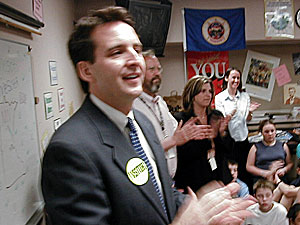|
Audio
Photos
More from MPR
Your Voice
|
Candidate Pawlenty kept business pursuits in background
July 17, 2003
St. Paul, Minn. — (AP) - Tim Pawlenty's campaign biography was so detailed it noted his membership in the Eagan Lions Club and his work as a youth soccer coach. And yet Pawlenty, an unusually open politician, didn't think certain business interests merited mention.
Now, his newly revealed ties to telecommunication businesses, some with troubling pasts, have the first-term Republican governor scrambling to stay on top of a spreading dust-up.
For two years, Pawlenty was on the board of directors of NewTel Holdings, the parent of a phone service company accused of unscrupulous practices in seven states. And Pawlenty disclosed Tuesday that he was a $4,500-a-month consultant and legal adviser to a third company run by longtime friend Elam Baer, a central figure in NewTel and the subsidiary, New Access.
Pawlenty was asked Tuesday whether he downplayed the business ties during his campaign.
"I didn't downplay them or upplay them," he said. "As to the NewTel board, I didn't feel that meeting a few times in a year was a substantial thing to tout as a life accomplishment."
For his consulting work: "I didn't view that as my job."
By several accounts, Pawlenty kept his business background close to the vest.
"I never concerned myself with nor was aware of the governor's business dealings," said Chris Georgacas, who was Pawlenty's campaign chairman. "I didn't care to know."
"We're talking about a guy who's been in public life for many years, a pretty well-known quantity. His biography and professional accomplishments were pretty well-known within political and media circles." Pawlenty talked openly about other business ties. After quitting his work for a well-known law firm, Pawlenty took a job with a memorably named Internet company, Wizmo, and noted those high-tech credentials when, for example, he helped craft a groundbreaking anti-spamming law.
And he wasn't as guarded about other parts of his background. Pawlenty was so aggressive about reporting any possible conflicts - any strings at all - from his work at the Twin Cities law firm that he was teased as a lawmaker. He was, colleagues said, the poster child for disclosure. He skipped votes on billion-dollar education funding bills because he had once represented school districts as an attorney, and avoided votes that could affect the salary of his wife, a judge.
Tom Horner, a GOP strategist and informal adviser to Pawlenty's campaign, disputed any suggestion that Pawlenty concealed his telecommunications background.
"A candidate looks at it like `I have only so many opportunities to capture the attention of voters. What's my best case? What's my elevator speech?"' Horner said. "There are some in the media who are looking at whether candidate Pawlenty was trying to hide what are perceived as negatives. As all candidates do, Pawlenty was trying to accent the positives."
Plus, the corporate ties clearly didn't meld with the image the Pawlenty team worked hard to cultivate: He grew up in a blue-collar neighborhood, was first in his family to graduate from college and went on to become a respected lawyer and legislator raising two daughters with his wife.
"Tim Pawlenty was trying to emphasize that he was the guy next door," said Lilly Goren, chairwoman of the College of St. Catherine's political science department. "His appeal was his regular guy-ness."
Yet Pawlenty had campaign events where describing the telecommunication connections would have seemed natural. In fact, one plank of his five-part "job-growth agenda" unveiled in July was a call for a "telecommunications summit" of industry executives.
"Let's face it," Pawlenty told reporters then, "the telecom industry is in meltdown mode."
He made the statement while he was on retainer to a pay-phone business owned by Baer and while he was still an investor with NewTel.
Under questioning Tuesday, Pawlenty couldn't recall the amount of time he spent working for Access Anywhere, the pay-phone company. The governor's office said Wednesday evening that Pawlenty was contractually prevented from releasing samples of his work for the company.
Baer said in an interview that the arrangement wasn't a sham. He said Pawlenty did that company's principal consulting work, including studying possible acquisitions outside of Minnesota.
"I don't think there was a month that went by that there wasn't some (work). Some weeks would be busy. Some weeks would be not busy," Baer said. "I think I got good value for what I paid."
Pawlenty said Access Anywhere was unrelated to NewTel. Public records list Baer as president of both companies and show the same downtown Minneapolis office suite as their address. Baer, however, said Access Anywhere actually operates out of Golden Valley.
It's impossible to know whether a fuller discussion of Pawlenty's telecommunications interests would have made any difference in the election, which he handily won. But the public deserved to know, said Bill Harper, who managed Democrat Roger Moe's gubernatorial campaign.
"It would have been another piece of information about his character, about the way he does business that would have been valuable for the voters to know," Harper said.
To State Auditor Patricia Awada, also busily defending her own ties to the companies, there may be a lesson to be learned. Said Awada, a fellow Republican, "It seems like you're better off erring on the side of overdisclosure of everything."
|
News Headlines
|
Related Subjects
|

